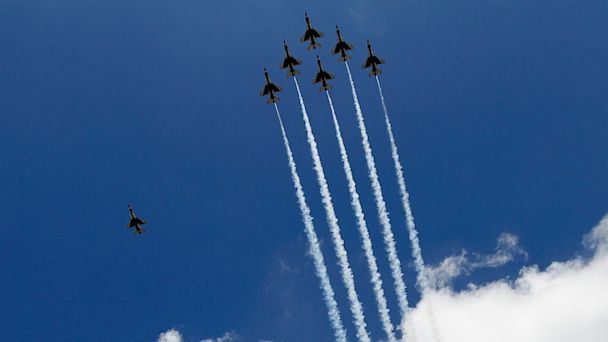Grounded Air Force Squadrons and Thunderbirds Take to the Skies Again … for Now

(Credit: John Dunn/AP Photo)
WASHINGTON - The Air Force will be able to allow 16 squadrons and the Thunderbirds demonstration team grounded by sequestration budget cuts to fly again, thanks to the shifting of existing funds.
But the move could be temporary, as Congress has yet to pass a Defense spending bill for 2014, which makes it possible the Air Force could once again ground squadrons when the new fiscal year begins in October.
The Air Force has grounded 16 squadrons of fighters, bombers and airborne warning and control aircraft (AWACS) since automatic budget cuts known as sequestration went into effect in early April. Also grounded was the popular F-16 Thunderbirds demonstration team, which was a big draw at air shows.
Top Air Force officials often cited the groundings as an example of how damaging the budget cuts were to their operational readiness.
In a statement issued today, Air Combat Command (ACC) at Joint Base Langley-Eustis in Virginia said planes in the U.S., Europe and the Pacific would be cleared to fly again after having received authority from Congress to shift $1.8 billion in existing funds. $208 million of that funding will enable the Air Force to restore flying hours to the grounded units.
Gen. Mike Hostage, commander of Air Combat Command said, "Since April we've been in a precipitous decline with regard to combat readiness. Returning to flying is an important first step but what we have ahead of us is a measured climb to recovery."
Grounded pilots will soon begin taking to the skies for training flights to get their units back into full combat mission-ready status. How long that process takes will vary from unit to unit, and it is possible some units could take as long as six months for their pilots to build up their flight hours.
With the fuzzy budget picture about what will happen with the start of the next fiscal year in October, Air Force officials are focused on the benefits of the restarted training.
"Getting hours now will allow us to get to a higher level of readiness as we begin fiscal year 2014," ACC spokeswoman Maj. Carrie Kessler said.
Though the Thunderbirds team will resume training, it will not participate in any air shows this year. They may take up a limited up a limited schedule of air shows next calendar year, depending on budget realities.
Because the funding only lasts through the end of the fiscal year on Oct. 1, the Thunderbirds training flights will only fly to build up their flight hours and not practice any of the difficult tight group formations they are known for.
"We have a long road ahead of us and will take it one day at a time," said Lt.Col. Greg Moseley, the Thunderbirds commander. "This is the first step in safely returning the squadron to a mission-ready status."
With continuing budget uncertainty and the need to maintain the continuity of training standards, the 12 pilots on the Thunderbirds team will have their two-year tours of duty extended by an additional year.
The Navy's Blue Angel performance team has also not participated in air shows because of the sequestration cuts, but it was allowed to continue with training flights for its pilots.
That was not the case for the Thunderbirds.
"We've been literally grounded," said Maj. Darrick Lee, a Thunderbirds spokesman. With only simulators available to train, Thunderbird team members have been doing community outreach by visiting schools, hospitals and youth groups in the Las Vegas area where the unit is based.
Lee said the team is optimistic that they will be able to participate in air shows next year, but they are also realistic that the looming budget uncertainty could mean they could once again be grounded come October.
"It's possible," he said. "We don't know what's going to happen in October."